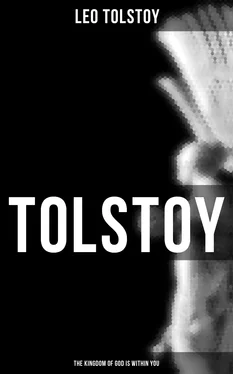Leo Tolstoy - Tolstoy - The Kingdom of God Is Within You
Здесь есть возможность читать онлайн «Leo Tolstoy - Tolstoy - The Kingdom of God Is Within You» — ознакомительный отрывок электронной книги совершенно бесплатно, а после прочтения отрывка купить полную версию. В некоторых случаях можно слушать аудио, скачать через торрент в формате fb2 и присутствует краткое содержание. Жанр: unrecognised, на английском языке. Описание произведения, (предисловие) а так же отзывы посетителей доступны на портале библиотеки ЛибКат.
- Название:Tolstoy: The Kingdom of God Is Within You
- Автор:
- Жанр:
- Год:неизвестен
- ISBN:нет данных
- Рейтинг книги:5 / 5. Голосов: 1
-
Избранное:Добавить в избранное
- Отзывы:
-
Ваша оценка:
- 100
- 1
- 2
- 3
- 4
- 5
Tolstoy: The Kingdom of God Is Within You: краткое содержание, описание и аннотация
Предлагаем к чтению аннотацию, описание, краткое содержание или предисловие (зависит от того, что написал сам автор книги «Tolstoy: The Kingdom of God Is Within You»). Если вы не нашли необходимую информацию о книге — напишите в комментариях, мы постараемся отыскать её.
Tolstoy: The Kingdom of God Is Within You — читать онлайн ознакомительный отрывок
Ниже представлен текст книги, разбитый по страницам. Система сохранения места последней прочитанной страницы, позволяет с удобством читать онлайн бесплатно книгу «Tolstoy: The Kingdom of God Is Within You», без необходимости каждый раз заново искать на чём Вы остановились. Поставьте закладку, и сможете в любой момент перейти на страницу, на которой закончили чтение.
Интервал:
Закладка:
Leo Tolstoy
Tolstoy: The Kingdom of God Is Within You

Books
OK Publishing, 2020
musaicumbooks@okpublishing.infoTous droits réservés.
EAN 4064066396398
Table of Contents
PREFACE.
CHAPTER I.
CHAPTER II.
CHAPTER III.
CHAPTER IV.
CHAPTER V.
CHAPTER VI.
CHAPTER VII.
CHAPTER VIII.
CHAPTER IX.
CHAPTER X.
CHAPTER XI.
CHAPTER XII.
PREFACE.
Table of Contents
In the year 1884 I wrote a book under the title "What I Believe," in which I did in fact make a sincere statement of my beliefs.
In affirming my belief in Christ's teaching, I could not help explaining why I do not believe, and consider as mistaken, the Church's doctrine, which is usually called Christianity.
Among the many points in which this doctrine falls short of the doctrine of Christ I pointed out as the principal one the absence of any commandment of non-resistance to evil by force. The perversion of Christ's teaching by the teaching of the Church is more clearly apparent in this than in any other point of difference.
I know—as we all do—very little of the practice and the spoken and written doctrine of former times on the subject of non-resistance to evil. I knew what had been said on the subject by the fathers of the Church—Origen, Tertullian, and others—I knew too of the existence of some so-called sects of Mennonites, Herrnhuters, and Quakers, who do not allow a Christian the use of weapons, and do not enter military service; but I knew little of what had been done by these so-called sects toward expounding the question.
My book was, as I had anticipated, suppressed by the Russian censorship; but partly owing to my literary reputation, partly because the book had excited people's curiosity, it circulated in manuscript and in lithographed copies in Russia and through translations abroad, and it evoked, on one side, from those who shared my convictions, a series of essays with a great deal of information on the subject, on the other side a series of criticisms on the principles laid down in my book.
A great deal was made clear to me by both hostile and sympathetic criticism, and also by the historical events of late years; and I was led to fresh results and conclusions, which I wish now to expound.
First I will speak of the information I received on the history of the question of non-resistance to evil; then of the views of this question maintained by spiritual critics, that is, by professed believers in the Christian religion, and also by temporal ones, that is, those who do not profess the Christian religion; and lastly I will speak of the conclusions to which I have been brought by all this in the light of the historical events of late years.
L. Tolstoy.
Yasnaïa Poliana,
May 14/26, 1893 .
"Ye shall know the truth, and the truth shall make you free."—John viii. 32.
"Fear not them which kill the body, but are not able to kill the soul; but rather fear him which is able to destroy both soul and body in hell."—Matt. x. 28.
"Ye have been bought with a price; be not ye the servants of men."—1 Cor. vii. 23.
"THE KINGDOM OF GOD IS WITHIN YOU."
Table of Contents
CHAPTER I.
Table of Contents
THE DOCTRINE OF NON-RESISTANCE TO EVIL BY FORCE HAS BEEN PROFESSED BY A MINORITY OF MEN FROM THE VERY FOUNDATION OF CHRISTIANITY.
Of the Book "What I Believe"—The Correspondence Evoked by it—Letters from Quakers—Garrison's Declaration—Adin Ballou, his Works, his Catechism—Helchitsky's "Net of Faith"—The Attitude of the World to Works Elucidating Christ's Teaching—Dymond's Book "On War"—Musser's "Non-resistance Asserted"—Attitude of the Government in 1818 to Men who Refused to Serve in the Army—Hostile Attitude of Governments Generally and of Liberals to Those who Refuse to Assist in Acts of State Violence, and their Conscious Efforts to Silence and Suppress these Manifestations of Christian Non-resistance.
Among the first responses called forth by my book were some letters from American Quakers. In these letters, expressing their sympathy with my views on the unlawfulness for a Christian of war and the use of force of any kind, the Quakers gave me details of their own so-called sect, which for more than two hundred years has actually professed the teaching of Christ on non-resistance to evil by force, and does not make use of weapons in self-defense. The Quakers sent me also their pamphlets, journals, and books, from which I learnt how they had, years ago, established beyond doubt the duty for a Christian of fulfilling the command of non-resistance to evil by force, and had exposed the error of the Church's teaching in allowing war and capital punishment.
In a whole series of arguments and texts showing that war—that is, the wounding and killing of men—is inconsistent with a religion founded on peace and good will toward men, the Quakers maintain and prove that nothing has contributed so much to the obscuring of Christian truth in the eyes of the heathen, and has hindered so much the diffusion of Christianity through the world, as the disregard of this command by men calling themselves Christians, and the permission of war and violence to Christians.
"Christ's teaching, which came to be known to men, not by means of violence and the sword," they say, "but by means of non-resistance to evil, gentleness, meekness, and peaceableness, can only be diffused through the world by the example of peace, harmony, and love among its followers."
"A Christian, according to the teaching of God himself, can act only peaceably toward all men, and therefore there can be no authority able to force the Christian to act in opposition to the teaching of God and to the principal virtue of the Christian in his relation with his neighbors."
"The law of state necessity," they say, "can force only those to change the law of God who, for the sake of earthly gains, try to reconcile the irreconcilable; but for a Christian who sincerely believes that following Christ's teaching will give him salvation, such considerations of state can have no force."
Further acquaintance with the labors of the Quakers and their works—with Fox, Penn, and especially the work of Dymond (published in 1827)—showed me not only that the impossibility of reconciling Christianity with force and war had been recognized long, long ago, but that this irreconcilability had been long ago proved so clearly and so indubitably that one could only wonder how this impossible reconciliation of Christian teaching with the use of force, which has been, and is still, preached in the churches, could have been maintained in spite of it.
In addition to what I learned from the Quakers I received about the same time, also from America, some information on the subject from a source perfectly distinct and previously unknown to me.
The son of William Lloyd Garrison, the famous champion of the emancipation of the negroes, wrote to me that he had read my book, in which he found ideas similar to those expressed by his father in the year 1838, and that, thinking it would be interesting to me to know this, he sent me a declaration or proclamation of "non-resistance" drawn up by his father nearly fifty years ago.
This declaration came about under the following circumstances: William Lloyd Garrison took part in a discussion on the means of suppressing war in the Society for the Establishment of Peace among Men, which existed in 1838 in America. He came to the conclusion that the establishment of universal peace can only be founded on the open profession of the doctrine of non-resistance to evil by violence (Matt. v. 39), in its full significance, as understood by the Quakers, with whom Garrison happened to be on friendly relations. Having come to this conclusion, Garrison thereupon composed and laid before the society a declaration, which was signed at the time—in 1838—by many members.
Читать дальшеИнтервал:
Закладка:
Похожие книги на «Tolstoy: The Kingdom of God Is Within You»
Представляем Вашему вниманию похожие книги на «Tolstoy: The Kingdom of God Is Within You» списком для выбора. Мы отобрали схожую по названию и смыслу литературу в надежде предоставить читателям больше вариантов отыскать новые, интересные, ещё непрочитанные произведения.
Обсуждение, отзывы о книге «Tolstoy: The Kingdom of God Is Within You» и просто собственные мнения читателей. Оставьте ваши комментарии, напишите, что Вы думаете о произведении, его смысле или главных героях. Укажите что конкретно понравилось, а что нет, и почему Вы так считаете.












